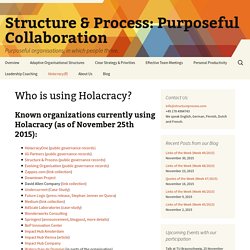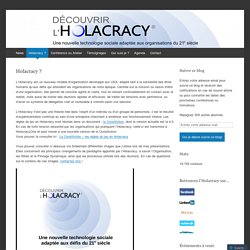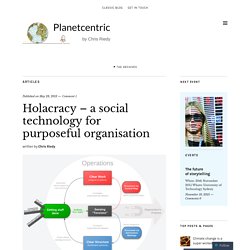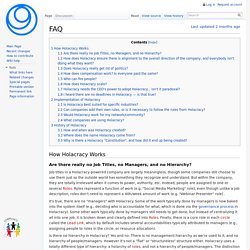

About Holacracy 2015 by Marion RUDDELL on Prezi. iGi Partners. Zappos Journey to Self-Organization. Writing Roles’ Accountabilities in Holacracy — About Holacracy. Accountabilities starting with “Enforcing…” or “Ensuring…” Usually indicates an attempt to mandate a result, e.g.

“Ensuring 20% growth in revenue”. It’s typical “what by when” thinking: setting a target and pushing toward it. However, we cannot mandate reality to be a certain way, we can only influence it as best as possible. The “how” to achieve that goal is the activity we want to capture as an accountability. Sometimes, these accountabilities convey an intent for the role to control the work of other roles, e.g., A Customer Service Lead with an accountability for “Ensuring that all Customer Service Agents provide a service of quality to customers”. To accomplish the intended effect, an alternative would be to propose adding an accountability on the Customer Service Agent role itself for “Responding to customers’ questions and helping them get what they need from our company, while offering the customer a positive experience of going through that process”. 5 choses à savoir sur l'holacratie.
Supprimer les positions de pouvoir et la bureaucratie, donner plus d'agilité à l'entreprise...

Les bienfaits supposés de l'holacratie sont tels que ce système de gouvernance mis au point en 2001 par un éditeur de logiciels américain, Ternary Software, a depuis fait des émules. Le cas le plus emblématique fut celui de Zappos, qui annonçait début 2014, qu'il passait à ce mode d'organisation enterrant la notion de hiérarchie. Holacracy, Explained: An Illustrated Guide to Management-Free Organizations - Page19. Have you heard about Holacracy? If you’re watching the startup and tech scene, then there’s a pretty good chance you have. Holacracy is a management-free way to run a company. It’s been around for a few years, but it may have come to your attention just recently when its inventor, Brian Robertson, released a book on the concept. Another place you might have recently heard about Holacracy is in the media when Tony Hsieh, Zappos CEO, asked his employees to either fully buy in to the company’s holacracy initiative or take their leave (along with a nice little bonus to sweeten the exit).
Even before all the media buzz, we at Blinkist were fascinated with Holacracy. Structure & Process: Purposeful Collaboration. To be confirmed: Organisations that have previously used Holacracy Please drop us a line if you know other examples or would like your organisation to be listed here!

This list was compiled and is being maintained by Martin Röll. Margaux Chiquet and Diederick Janse helped with the initial version. A fork of this list exists at Agile Organisation. What is Holacracy? Org Hacking. The real boon in coming across Nick Grossman‘s blog, is discovering all the work he’s done around “Regulation 2.0”, which he recently summarized in a whitepaper: “Regulation, The Internet Way” Nick’s main thesis is that large scale internet platforms (eBay, AirBnB, Uber, etc.) are utilizing a different paradigm in regulating user behavior on their platforms, compared to the paradigm used by “traditional” governing institutions.

And now, it’s time for the traditional governing institutions to start adopting the new paradigm as well. Under the old paradigm, trust, safety and security risks are managed using a permission-based model: who can act and how are being defined in detail and upfront; permission to operate needs to be granted explicitly, typically using a certification/licensing scheme. But once permission is granted, accountability/compliance is only weakly enforced, typically using periodic inspections.
Encouraging evidence already exists. Réunion de triage en holacratie v2. Découvrir l'Holacracy® L’Holacracy est un nouveau modèle d’organisation développé aux USA, adapté tant à la sensibilité des êtres humains qu’aux défis qui attendent les organisations de notre époque.

Centrée sur la mission ou raison d’être d’une organisation, elle permet de concilier agilité et clarté, tout en restant continuellement en contact avec la réalité, mais aussi de mener des réunions rapides et efficaces, de traiter les tensions avec pertinence, ou d’avoir un système de délégation clair et modulable à volonté selon vos besoins. L’Holacracy n’est pas une théorie née dans l’esprit d’un individu ou d’un groupe de personnes, c’est le résultat d’expérimentation continue au sein d’une entreprise cherchant à améliorer son fonctionnement interne.
Les règles du jeu en Holacracy sont réunies dans un document : la Constitution, dont la version actuelle est la 4.0. Vous pouvez consulter ci dessous via Slideshare différentes images que j’utilise lors de mes présentations. J'aime : Th des organisations. Holacracy – a social technology for purposeful organisation. I’ve been thinking a lot recently about how my organisation – the Institute for Sustainable Futures – organises and governs itself.

We are in the midst of developing a long-term strategy for the organisation and it is opening up a lot of thinking for me about how we can best organise ourselves to meet our purpose – which is to facilitate change towards sustainable futures. I think the way we organise ourselves to align with our values and purpose is really important to help us achieve that purpose.
While doing this thinking, I stumbled across a new social technology for organisations called Holacracy. Brian Robertson is the driving force behind holacracy and he established Holacracy One to take it out into the world. He tells his story in the TEDx video below. Reflections on organization, emergence, and control in sociotechnical systems. Introduction à l'Holacracy. Watch & Digest "Holacracy" by Brian Robertson in 4 minutes (Book Summary) Holacracy Featured on Al Jazeera - Jan. 2014.
Holacracy Insider. FAQ - Holacracy Wiki. How Holacracy Works Are there really no Job Titles, no Managers, and no Hierarchy?

Job titles in a Holacracy-powered company are largely meaningless, though some companies still choose to use them just so the outside world has something they recognize and understand. But within the company, they are totally irrelevant when it comes to power, authority, etc. Instead, people are assigned to one or several Roles. Roles represent a function of work (e.g. It's true, there are no "managers" with Holacracy. Resources – Holacracy. Holacracy Insider. Créons ensemble un monde positif.